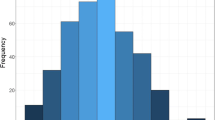Abstract
Freedom and rationality have traditionally been viewed as essential ingredients to the 'pursuit of happiness'. Previous research has found that the way in which happiness is linked to freedom and other attributes of individualistic society is affected by the income level. This paper formulates a structural model of the linkage between political freedom, rationality, and happiness which takes explicit account of income as a mediating variable. Since income is hypothesized to be linked to the degree of freedom and rationality prevailing in a society, this approach permits to distinguish between direct and indirect linkages of happiness to freedom and rationality. Estimating the model with cross-national data yields the following key findings: (1) Happiness is positively related to freedom as well as to rationality at high freedom/rationality levels and negatively at low levels. (2) Whereas freedom affects happiness only indirectly (through its impact on income), rationality has both direct and indirect effects on happiness.
Similar content being viewed by others
REFERENCES
Barro, R.J.: 1996, ‘Democracy and growth’, Journal of Economic Growth 1, pp. 1-27.
Davidson, R. and J.G. McKinnon: 1993, Estimation and Inference in Econometrics (Oxford University Press, New York).
Diener, E., E.M. Suh, R.E. Lucas and H.L. Smith: 1999, ‘Subjective well-being: Three decades of progresss’, Psychological Bulletin 125, 276-302.
Diener, E. and S. Oishi: 2000, ‘Money and happiness: Income and subjective wellbeing across nations', in E. Diener and E.M. Suh (eds), Culture and Subjective Well-Being (MIT Press, Cambridge, MA).
Ellison, C.G.: 1991, ‘Religious involvement and subjective well-being’, Journal of Health and Social Behavior 32, pp. 80-99.
ESI: 2001, 2001 Environmental Sustainability Index, World Economic Forum (WEF), Yale Center for Environmental Law and Policy (YCELP), Center for International Earth Science Information Network (CIESIN), January 2001, www.ciesin.columbia.edu/indicators/ESI.
Freedom House: 2000, Freedom in the World 1999-2000, (Freedom House, New York).
Frey, B.S. and A. Stutzer: 2002, ‘What can economists learn from happiness research?’, Journal of Economic Literature XL, pp. 402-435.
Inglehart, R. and H.D. Klingemann: 2000, ‘Genes, culture, democracy, and happiness', in E. Diener and E.M. Suh (eds), Culture and Subjective Well-Being (MIT Press, Cambridge, MA).
Hall, R. and C. Jones: 1999, ‘Why do some countries produce so much more output per worker than others?’, Quarterly Journal of Economics 114, pp. 83-116.
Helliwell, J.F.: 2003, ‘How's life? Combining individual and national variables to explain subjective well-being’, Economic Modelling 20, pp. 331-360.
Kenny, C.: 1999, ‘Does growth cause happiness, or does happiness cause growth?’, Kyklos 52, pp. 3-26.
Sala-i-Martin, X.: 1997, ‘I just ran two million regressions', American Economic Review 87, pp. 178-183.
Sen, A.: 1999, Development as Freedom (Random House, New York).
Schyns, P.: 1998, ‘Crossnational differences in happiness: Economic and cultural factors explored’, Social Indicators Research 43, pp. 3-26.
Veenhoven, R.: 1993, Happiness in Nations: Subjective Appreciation of Life in 56 Nations 1946-1992 (Erasmus University Press, Rotterdam)
Veenhoven, R.: 1995, ‘The cross-national pattern of happiness: Test of predictions implied in three theories of happiness', Social Indicators Research 34, pp. 33-68.
Veenhoven, R.: 1997, Advances in Understanding Happiness, Erasmus University Rotterdam, published in French in Revue Quebecoise de Psychologie 18, pp. 29-79.
Veenhoven, R.: 1999, ‘Quality of life in individualistic society: A comparison of 45 nations in the early 1990s', Social Indicators Research 48, pp. 157-186.
Veenhoven, R.: 2000, ‘Freedom and happiness: A comparative study in forty-four nations in the early 1990ss’, in E. Diener and E.M. Suh (eds), Culture and Subjective Well-Being (MIT Press, Cambridge, MA).
Veenhoven, R.: 2001, World Database of Happiness, www.eur.nl/fws/research/happiness, 1 August, 2001.
Author information
Authors and Affiliations
Rights and permissions
About this article
Cite this article
Welsch, H. Freedom and Rationality as Predictors of Cross-National Happiness Patterns: The Role of Income as a Mediating Variable. Journal of Happiness Studies 4, 295–321 (2003). https://doi.org/10.1023/A:1026249123711
Issue Date:
DOI: https://doi.org/10.1023/A:1026249123711




